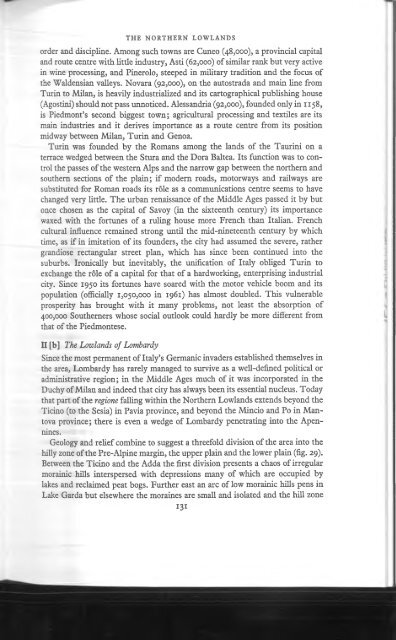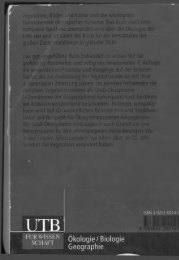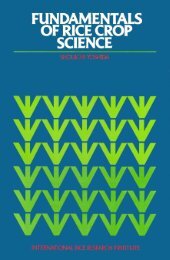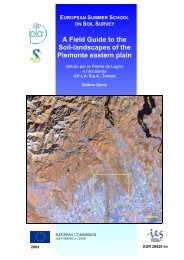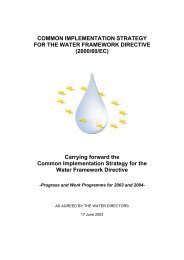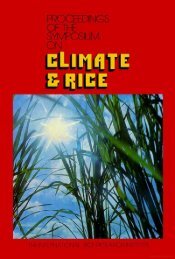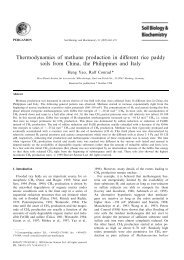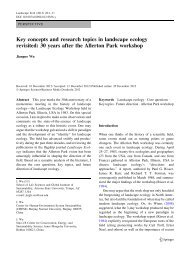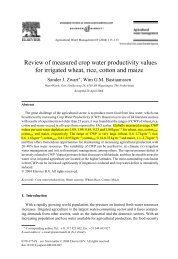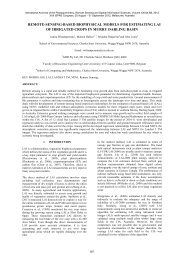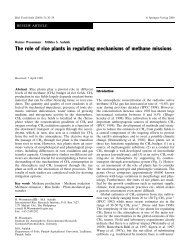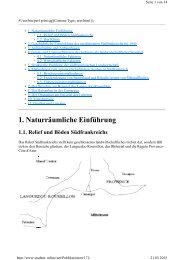Walker - 1967 - A geography of Italy
Walker - 1967 - A geography of Italy
Walker - 1967 - A geography of Italy
You also want an ePaper? Increase the reach of your titles
YUMPU automatically turns print PDFs into web optimized ePapers that Google loves.
THE N O R T H E R N L O W L A N D S<br />
long since seized the opportunity to drain the area by gravity channels. These are<br />
the terre vecchie so called because their reclamation and settlement may go back<br />
as far as the sixteenth century. Elsewhere the stagnant waters defied reclamation<br />
imtil efficient pumps made poldering possible; even then the lowering o f the<br />
surface by shrinkage <strong>of</strong>ten threatened to tmdo the work. The struggle in these<br />
lower areas (valli) has been on for over a century; work on the Grandi Valli<br />
Veronesi dates from the 1850s and the Isola d’Ariano was not tackled until 1912.<br />
The delta itself <strong>of</strong>fered an even more daunting challenge and although most o f it<br />
has now been won for cultivation, some 100,000 hectares remain untamed. In the<br />
past reclamation was in the hands o f private consorzi but now it is mainly the<br />
responsibility o f the Ente per la Colonizazzione del Delta Padano. Although with<br />
time the contrast fades, the terre vecchie are distinguished from the newer bonifiche<br />
by the greater variety o f their field crops (cereals, beet, fodder, hemp, etc.)<br />
and by the more extensive cultivation o f tree crops whether planted in lines or in<br />
compact orchards. The newer lands present a dismal empty landscape, gridded<br />
with ditches, its horizon bounded by massive dykes hiding all but the church<br />
towers o f distant villages. Except on land recently won by the Ente Delta, the<br />
expense o f drainage favoiured large capitalistic properties many o f which have inevitably<br />
received the attention o f the land reform authorities,^ but unless<br />
mechanization and other technical improvements are to be permanently impeded<br />
redundancy among the labour force must be drastically reduced. In newly reclaimed<br />
areas rice is usually the pioneer crop but as the land matures it gives way<br />
to cereals, fodder, industrial crops, especially beet and hemp, and fruit.<br />
The cities o f Veneto, with few exceptions, stand firm on their Roman foimdations;<br />
Aquileia, once the gateway to Pannonia, never recovered from its sack by<br />
the Huns, and Venice (Venezia) must be considered a newcomer, but Padua<br />
(Padova) and Vicenza still knot together the routes pioneered by the Romans,<br />
and Bassano and Verona still control Claudius’s roads up into the Alps. The<br />
railway between Verona and Trieste could not do better than follow the route<br />
first traced by the Via Postumia. Despite their recent growth the cities o f Veneto<br />
retain something o f the dignified air they acquired when ‘La Dominante’ held<br />
sway, and most o f them are still essentially centres o f communications and commerce<br />
serving a rich coimtryside. Apart from agricultural processing which is<br />
widely shared, textiles are the most important industrial activity. Silk spinning,<br />
based on local materials, has survived at Treviso from the Middle Ages, but the<br />
woollen manufactures (including knitwear and knitting wool) o f Schio, Thiene,<br />
Arzignano, Pieve Rocchete (Rossi), and Valdagno (Marzotto) in northern<br />
Vicenza province are much more important. This industry in which Padua and<br />
Venice share has also a long tradition. The cottons o f Thiene, Montebellimo,<br />
Lonigo, Cornegliano and Gorizia, the jute o f S. Dona and the rayon o f Torviscosa<br />
are o f much more recent date. Apart from small quantities o f lignite and<br />
'E y 1959 some 6800 hectares in Polesine had been converted into 1100 poderi with<br />
varying success.<br />
1 4 3


